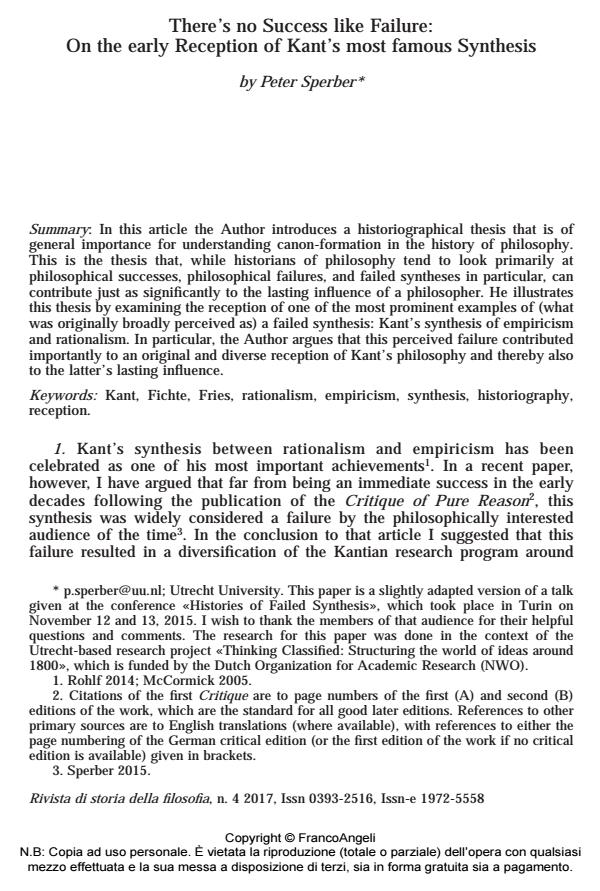There’s no Success like Failure: On the early Reception of Kant’s most famous Synthesis
Journal title RIVISTA DI STORIA DELLA FILOSOFIA
Author/s Peter Sperber
Publishing Year 2017 Issue 2017/4
Language English Pages 10 P. 597-606 File size 41 KB
DOI 10.3280/SF2017-004005
DOI is like a bar code for intellectual property: to have more infomation
click here
Below, you can see the article first page
If you want to buy this article in PDF format, you can do it, following the instructions to buy download credits

FrancoAngeli is member of Publishers International Linking Association, Inc (PILA), a not-for-profit association which run the CrossRef service enabling links to and from online scholarly content.
In this article the Author introduces a historiographical thesis that is of general importance for understanding canon-formation in the history of philosophy. This is the thesis that, while historians of philosophy tend to look primarily at philosophical successes, philosophical failures, and failed syntheses in particular, can contribute just as significantly to the lasting influence of a philosopher. He illustrates this thesis by examining the reception of one of the most prominent examples of (what was originally broadly perceived as) a failed synthesis: Kant’s synthesis of empiricism and rationalism. In particular, the Author argues that this perceived failure contributed importantly to an original and diverse reception of Kant’s philosophy and thereby also to the latter’s lasting influence.
Keywords: Kant, Fichte, Fries, rationalism, empiricism, synthesis, historiography, reception.
- Beiser 1987: Frederick C. Beiser, The Fate of Reason: German Philosophy from Kant to Fichte, Harvard University Press, Cambridge 1987.
- Beiser 2014: Id., Two Traditions of Idealism, in Matthew C. Altman (ed.), The Palgrave Handbook of German Idealism, Palgrave Macmillan, New York 2014, pp. 744-758.
- Engfer 1996: Hans-Jürgen Engfer, Empirismus versus Rationalismus? Kritik eines philosophiegeschichtlichen Schemas, Schöningh, Paderborn 1996.
- Fichte 1962: Johann Gottlieb Fichte, Gesamtausgabe der Bayerischen Akademie der Wissenschaften, Frommann, Stuttgart 1962.
- Fichte 1982: Id., The Science of Knowledge: With the First and Second Introductions, Peter Heath and John Lachs (eds.), Cambridge University Press, Cambridge 1982.
- Fischer 1862: Fischer Kuno, Die beiden Kantischen Schulen in Jena: Rede zum Antritt des Prorektorats, den 1. Februar 1862, Cotta’scher Verlag, Stuttgart 1862.
- Fries 1798: Jakob Friedrich Fries, Über das Verhältnis der empirischen Psychologie zur Metaphysik, «Psychologisches Magazin», 3 (1798), pp. 156-202.
- Fries 1803: Jakob Friedrich Fries, Reinhold, Fichte und Schelling, August Lebrecht Reinicke, Leipzig 1803.
- Fries 1807: Id., Neue Kritik der Vernunft, Mohr und Zimmer, Heidelberg 1807.
- Hegel 1968ff: Georg Wilhelm Friedrich Hegel, Gesammelte Werke, Meiner, Hamburg 1968ff.
- Hegel 1977: Id., Faith and Knowledge, transl. Walter Cerf and Henry Harris (eds.), State University of New York Press, New York 1977.
- Jacobi 1995: Friedrich Heinrich Jacobi, The Main Philosophical Writings and the Novel Allwill, transl. George Di Giovanni, McGill-Queen’s University Press, Montreal 1995.
- Kant 1900ff: Immanuel Kant, Gesammelte Werke, ed. Königlich Preußische (später Deutsche) Akademie der Wissenschaften, Reimer-de Gruyter, Berlin 1900ff.
- Maimon 2010: Salomon Maimon, Essay on Transcendental Philosophy, transl. Nick Midgley, Henry Somers-Hall, Alistair Welchman, Mergen Reglitz (eds.), Continuum, London-New York 2010.
- McCormick 2005: Matt McCormick, Immanuel Kant: Metaphysics, in Internet Encyclopedia of Philosophy, 2005. (http://www.iep.utm.edu/kantmeta/).
- Reinhold 1791: Karl Leonhard Reinhold, Über das Fundament des philosophischen Wissens: nebst einigen Erläuterungen über die Theorie des Vorstellungsvermögens, Mauke, Jena 1791.
- Rohlf 2014: Michael Rohlf, Immanuel Kant, in Edward N. Zalta (ed.), The Stanford Encyclopedia of Philosophy, Summer 2014.
- Schelling 1856: Friedrich Wilhelm Joseph Schelling, Sämtliche Werke, Cotta, Stuttgart-Augsburg 1856.
- Schmid 1788: Carl Christian Erhard Schmid, Einige Bemerkungen über den Empirismus und Purismus in der Philosophie; durch die Grundsätze der reinen Philosophie von Herrn Selle veranlaßt, in Wörterbuch zum leichtern Gebrauch der Kantischen Schriften nebst einer Abhandlung, (2nd edition) Crökerschen Buchhandlung, Jena 1788.
- Schulze 1792: Gottlob Ernst Schulze, Aenesidemus: oder, über die Fundamente der von dem Herrn Professor Reinhold in Jena gelieferten Elementar-Philosophie, place and publisher not available, 1792.
- Sperber 2015: Peter Sperber, Empiricism and Rationalism: The Failure of Kant’s Synthesis and its Consequences for German Philosophy around 1800, «Kant Yearbook», 7 (2015), 1, pp. 115-138.
- Vanzo 2013: Alberto Vanzo, Kant on Empiricism and Rationalism, «History of Philosophy Quarterly», 30 (2013), 1, pp. 53-74.
- Zeidler 2000: Kurt Walter Zeidler, Prolegomena zur Wissenschaftstheorie, Königshausen & Neumann, Würzburg 2000.
Peter Sperber, There’s no Success like Failure: On the early Reception of Kant’s most famous Synthesis in "RIVISTA DI STORIA DELLA FILOSOFIA" 4/2017, pp 597-606, DOI: 10.3280/SF2017-004005